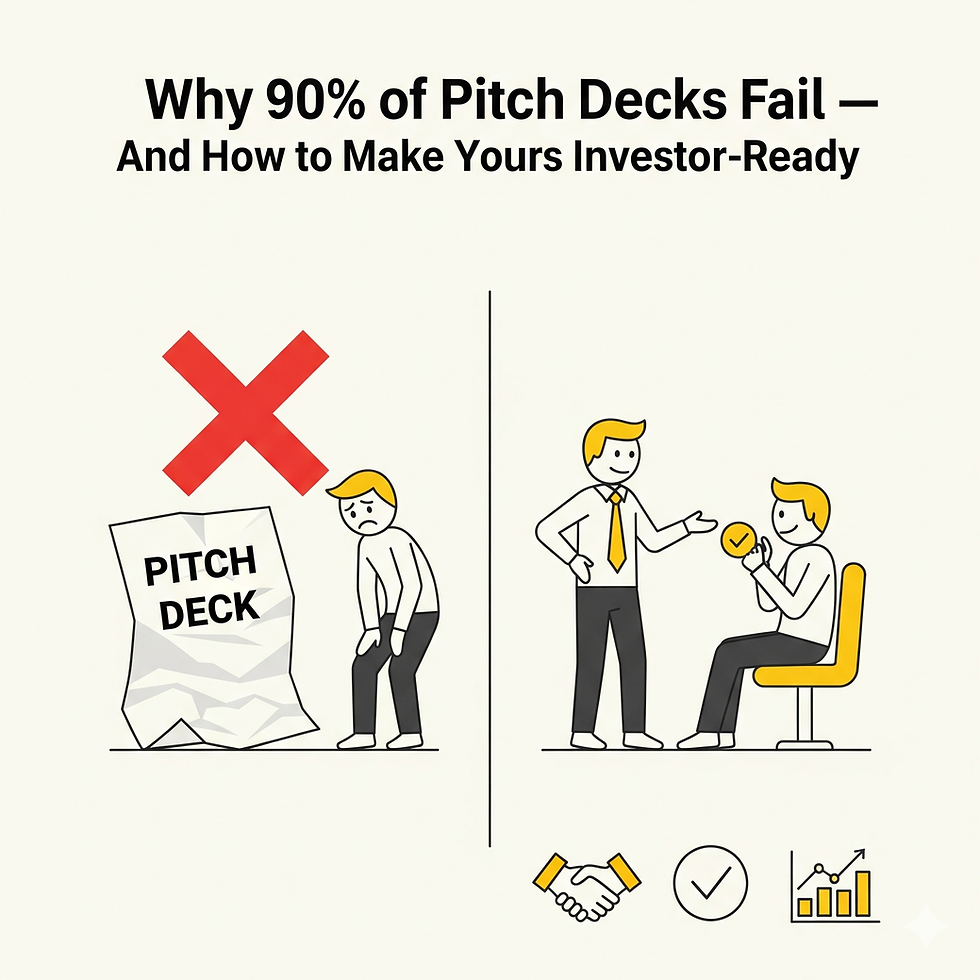What Is a Service Business Valuation? A Complete Beginner’s Guide
- Yash Sharma

- Nov 15, 2025
- 4 min read
If you're a U.S. founder, chances are you’ve wondered:
“What is my business actually worth?”
You’re not alone. Service-based companies—whether consulting firms, agencies, SaaS-enabled services, trades, or professional services—tend to grow quickly but unevenly. That makes a service business valuation both essential and surprisingly complex.
This beginner’s guide breaks down what a valuation really means, how it’s calculated, and why getting an expert analysis can significantly increase your deal outcomes when raising capital, selling your company, or planning an exit.

Why Service Business Valuation Matters for Founders
Most founders know their business is valuable—but not necessarily how valuable.
Here’s the truth:
Service businesses often have intangible value drivers that don’t show up on the balance sheet. Your customer relationships, systems, founder dependency, retention rates, and recurring revenue streams all play a major role. Unfortunately, many DIY valuation tools overlook these factors entirely.
A proper service business valuation is more than a number. It’s a strategic analysis that helps you:
Understand the true financial health of your company
Prepare for fundraising or acquisition conversations
Identify valuation gaps before buyers or investors do
Build a stronger and more defensible business plan
Gain negotiating power when discussing equity or potential exits
Founders who skip this step often undervalue their business—or accept terms that don’t reflect their actual worth.
What Exactly Is a Service Business Valuation?
A service business valuation is a formal assessment of how much your company is worth today based on financial, operational, and market-driven factors.
While product-based companies rely heavily on inventory and tangible assets, service companies rely on performance indicators like:
Revenue quality
Client concentration
Contract terms
Operational efficiency
Profit margins
Team capacity and systems
The valuation process translates these elements into a dollar amount that investors, buyers, lenders, or partners can trust.
How Service Business Valuations Are Calculated
There is no single formula. Instead, valuation experts use a combination of accepted methods depending on your stage, industry, and financials.
1. Income Approach (Most Common for Service Companies)
This method estimates the future cash flow your company can generate and discounts it back to today’s value. It’s ideal for founders with predictable revenue or retainer-based clients.
2. Market Approach
Your valuation is compared to similar companies that have sold recently.This is useful in industries with active M&A activity, such as marketing agencies, IT services, and consulting firms.
3. Asset Approach
More common in product businesses, but still used when a service company holds intellectual property, proprietary tools, or significant equipment.
Most founders benefit most from the income approach, because it captures the long-term value of your systems and recurring revenue rather than just your assets.
Key Factors That Influence Your Service Business Valuation
Investors and acquirers consistently look at the same high-impact factors:
✔ Revenue Consistency
Monthly recurring revenue (MRR) or annual recurring revenue (ARR) is extremely valuable. The more predictable your income, the higher your valuation.
✔ Profit Margins
Healthy margins show operational discipline and scalability. Service companies with 20–30%+ margins typically earn higher multiples.
✔ Client Concentration
If one client makes up more than 20–30% of your revenue, your valuation may be discounted. Diversification boosts confidence.
✔ Founder Dependency
If the business cannot function without you, valuation drops. Systems, delegation, and processes increase enterprise value.
✔ Market Position and Brand Strength
Strong reputation, reviews, case studies, and niche specialization all increase perceived value.
✔ Growth Trajectory
Buyers pay for where your business is going—not where it has been.
Why DIY Valuations Fall Short (And Cost Founders Real Money)
Google spreadsheets and online calculators can be tempting, but they almost always:
Ignore nuanced market conditions
Overlook service-based cash flow complexity
Miss industry-specific valuation multiples
Misprice intangible assets
Fail to account for buyer psychology
Worse, founders often submit these DIY valuations to investors—only to be challenged or dismissed. That can derail conversations early.
A professional valuation arms you with credibility and leverage. It signals preparedness and confidence—traits investors respect.
Why Total Finance Resolver Is the Best Partner for Founders
Total Finance Resolver is built specifically for founders who want high-precision valuation work handled by real experts—not generic templates.
Our team includes former Goldman Sachs and JP Morgan investment bankers who understand both the financial modeling and the negotiation realities behind valuations.
With us, you get:
Accurate, investor-grade valuation reports
Guidance tailored to service-based businesses
Business plan adjustments that strengthen your valuation
Strategic insights that help you prepare for fundraising or exits
Practical recommendations to increase multiples
We treat every valuation like a deal room document—not a simple estimate.
Ready to Learn What Your Service Business Is Really Worth?
Whether you’re raising capital, preparing for a sale, or simply want to understand your current value, an expert-led service business valuation gives you the clarity and confidence you need.
Schedule Your Free Consultation Today
Get a free consultation with ex–Goldman Sachs and JP Morgan investment bankers. Learn your true valuation and what steps can increase it—before you enter any negotiations.



Comments